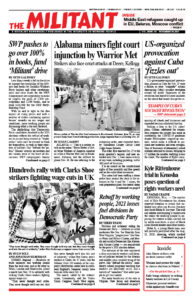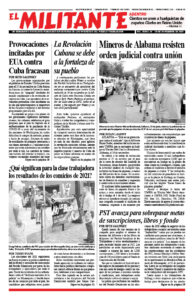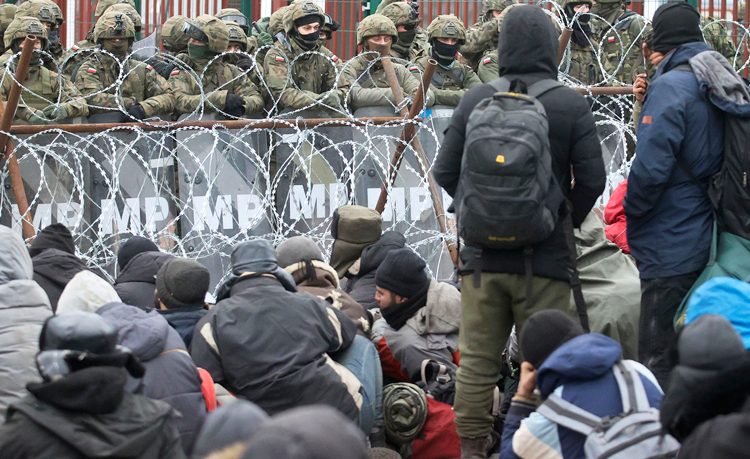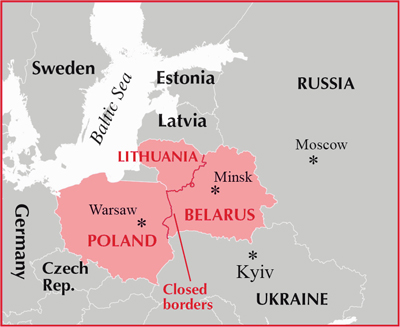Thousands of asylum-seekers are trapped between the borders of Belarus and neighboring Poland and Lithuania, in freezing conditions. Fleeing countries in the Mideast, they are trying to enter western Europe via Belarus. The crisis has sharpened disputes between the imperialist governments in the European Union and the dictatorial regime of Belarusian President Alexander Lukashenko.
Washington and its European allies are threatening more sanctions against the Belarusian government. They haven’t recognized Lukashenko’s regime since he flagrantly rigged his presidential reelection in August 2020. Working people across Belarus joined huge protests and strikes demanding Lukashenko step down. He has held onto power by imprisoning and exiling opponents and enforcing a violent crackdown, backed by his longtime ally in Moscow.
Lukashenko is orchestrating the migrant movement, hoping to force the lifting of sanctions. Moscow has backed this to strengthen its hand in increasing gas exports and market share in Europe.
Upwards of 15,000 migrants, many in makeshift camps along Belarus’ western borders, are mainly young men. Some are women and children. Many are Kurds from Syria and Iraq. Others are from Yemen or Afghanistan. Along the forested no-man’s-land between razor-wire fences, they have little shelter, heat, water or food. So far at least 11 people have died on the Polish side, and an unknown number in Belarus, mainly from hypothermia.
Troop buildup both sides of border
Polish police drive back those who try to break through the fences. The refugees are also prevented from retreating by the Belarusian police who escorted them there. The Polish, Lithuanian and Latvian governments have fenced off their borders. Some 15,000 Polish troops and thousands more from Lithuania and Latvia have been deployed.
There are about 4,000 U.S. troops and 1,000 other NATO soldiers stationed in Poland and a further 4,000 NATO forces in the Baltic States.
Moscow said it views troop movements in Poland and the Baltic States as a threat. On Nov. 10 it sent heavy bombers, escorted by Belarusian fighters, near the Polish border. A couple of days later, Moscow and Minsk followed this up with joint paratrooper drills in the Grodno border area with Poland.
“We are just a stick that they are beating each other with,” Rawand Akram, a 23-year-old Kurd from Iraq, told the New York Times. “We are in the middle of their fight.”
Belarusian authorities, backed by Moscow, offered visas and the promise of easy passage to western Europe to people from Mideast countries trying to escape the impact of war, government repression and rising hardship. Belarusian police then bused them to the borders of Poland, Lithuania and Latvia, giving them wire cutters and pushing groups to break through. Those stuck on the border had flown to Belarus from Erbil, Iraqi Kurdistan; Baghdad; Amman, Jordan; Beirut; and Istanbul. These flights have doubled in the past year. Some 37,000 Iraqis have left the country this way since January, as many as half of them from Kurdish regions.
Conditions in Iraqi Kurdistan are difficult today. Islamic State-armed forces are functioning in the area and Turkish forces are conducting military raids against Kurdish militias who operate from within Iraq. This is on top of harsh economic and social conditions facing working people.
European governments are threatening to close their airports to airlines that continue flying asylum-seekers to Minsk.
On Nov. 14 the Iraqi government announced it was organizing flights for any Iraqis who volunteer to return to the country from Minsk.
Russia, Ukraine military tensions
Lukashenko threatened Nov. 11 to retaliate against EU sanctions on Belarus by shutting off gas piped from Russia across Belarus to western Europe. Putin rebuked him, saying this would be “a breach of our gas transit contract.” Moscow is using the worsening gas shortages and rising prices in Europe to try to get its new Nord Stream 2 gas pipeline to Germany approved and to increase its leverage in the region.
Secretary of State Antony Blinken gave Washington’s backing to Polish authorities in the conflict with Lukashenko. He said the Russian government was using the refugee crisis to distract attention from its recent troop buildup on its Ukrainian border, which has upped tensions there.



